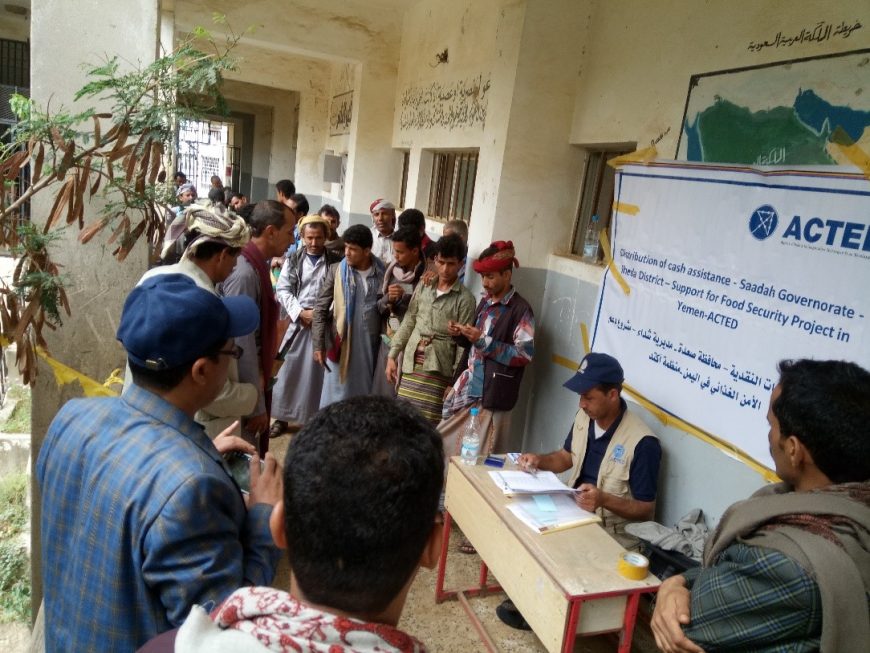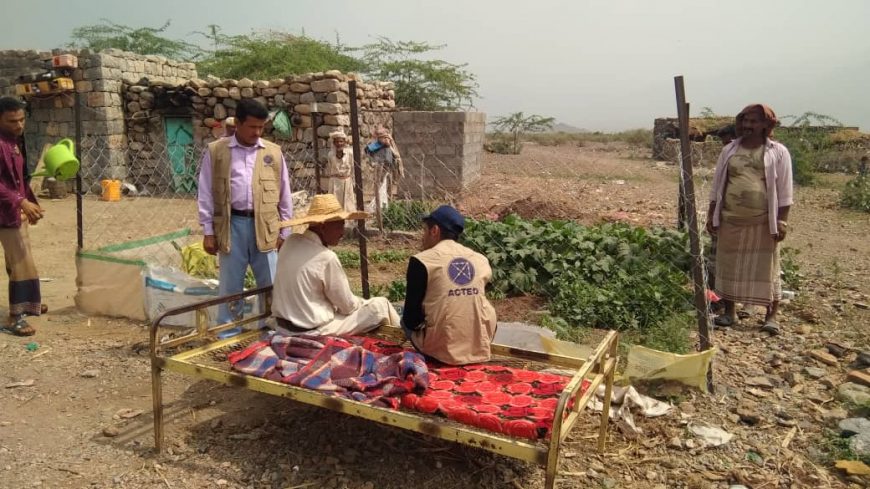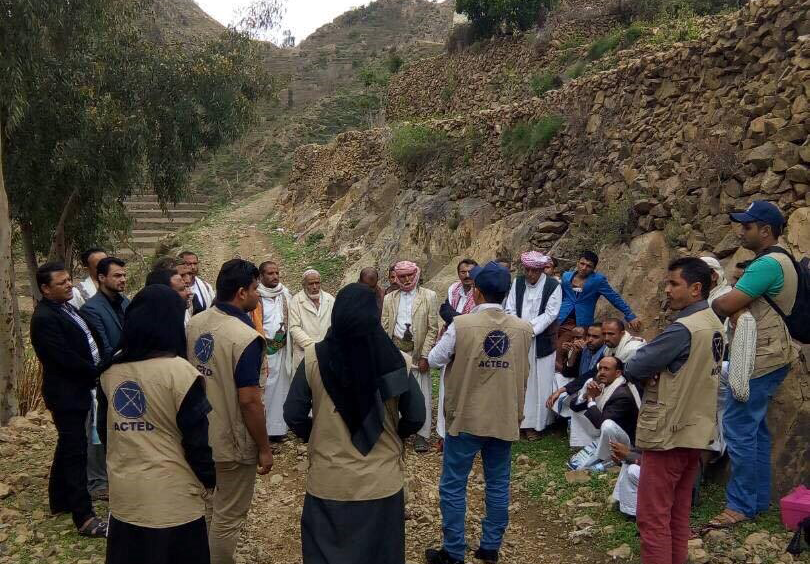With a combination of conflict, cholera, extreme food insecurity, and widespread poverty, since 2018 Yemen is considered the worst humanitarian crisis anywhere in the world, and the situation continues to deteriorate. More than 24 million Yemenis, approximately 80% of the population, now require some form of humanitarian assistance, and as many as 10 million people are at risk of starvation. The situation is almost entirely the product of man-made factors, including the conflict itself and the bureaucratic impediments, movement restrictions and other obstacles that prevent aid reaching those in need.
Our current and future projects in Yemen
Multi sector response for displaced populations
 In 2018, ACTED delivered Rapid Response Mechanism kits including ready-to-eat food, transit kits and dignity kits. ACTED will continue its participation in the Rapid Response Mechanism into 2019. ACTED helps displaced households meet their shelter needs through provision of shelter kits and winterization kits, with financial support from OFDA, as well as providing rental subsidies for displaced families who wish to relocate (through Yemen Humanitarian Fund support).
In 2018, ACTED delivered Rapid Response Mechanism kits including ready-to-eat food, transit kits and dignity kits. ACTED will continue its participation in the Rapid Response Mechanism into 2019. ACTED helps displaced households meet their shelter needs through provision of shelter kits and winterization kits, with financial support from OFDA, as well as providing rental subsidies for displaced families who wish to relocate (through Yemen Humanitarian Fund support).
- In 2019, ACTED will play a bigger role in site management: in addition to coordinating IDP hosting sites, ACTED and its partners will directly provide multi-sectoral services to meet the needs of displaced families.
The crisis in Yemen is one of the world’s largest protection crises, and has forcibly displaced more than three million people from their homes, 3,3 million of whom remain displaced. An estimated 6.7 million people need emergency shelter or essential household items, including IDPs, host communities and initial returnees. Ongoing conflict-related displacements, as well as initial returns to some areas, are driving these needs
Yemenis are experiencing the worst catastrophe in contemporary history.
More than 15 million people are threatened by famine.

Food security response
 ACTED is responding with food vouchers and cash transfers to allow families to purchase food. ACTED also promotes food security through agricultural interventions such as seeds distribution and agricultural trainings.
ACTED is responding with food vouchers and cash transfers to allow families to purchase food. ACTED also promotes food security through agricultural interventions such as seeds distribution and agricultural trainings.
- ACTED worked with the OFDA to support 2,400 farmers across Raymah, AlDhale’e, and AlJawf governorates. These are key agricultural zones to encourage agricultural production and food security since they are where the most vulnerable farmers cannot buy seeds and, as a result, are unable to produce anything.
- An estimated 2 million children under the age of 5 and 1 million pregnant or lactating women are acutely malnourished, including almost 360,000 children who are suffering from severe acute malnutrition. An estimated 7.5 million people are in need of nutrition assistance, with 2.9 million people who will require treatment for acute malnutrition in 2017
- ACTED leads a consortium of NGOs in Yemen integrating treatment of malnutrition with provision of cash for food, nutrition awareness, and improved WASH infrastructure and hygiene training, to holistically address the causes and symptoms of malnutrition in Al Dhale’e, Jawf and Sa’ada (partnership with DfID).
The conflict has destroyed people’s livelihoods and reduced their purchasing power, making it difficult for many Yemenis to meet minimal food needs and forcing many to resort to negative coping strategies.

Water and sanitation projects
 Damaged infrastructure and collapsed civil services (including health and water provision) have led to the worst cholera outbreak in Yemen’s history. 17.8 million people lack access to safe water and sanitation.
Damaged infrastructure and collapsed civil services (including health and water provision) have led to the worst cholera outbreak in Yemen’s history. 17.8 million people lack access to safe water and sanitation.
- Because of collapsing public institutions, people’s access to essential services such as water, sanitation, health care and education has been further constrained. Only half of the total health facilities are functioning, and even these face severe shortages in medicines, equipment, and staff.
- ACTED works with Yemeni communities to rehabilitate water points and networks, as well as WASH infrastructure in health facilities, in order to reduce the spread of water-borne diseases such as cholera. Hygiene promotion complements these rehabilitations by informing communities of safe practices (e.g. handwashing), and is supplemented with distribution of hygiene and/or cholera kits containing basic hygiene items. ACTED’s WASH interventions are supported by DfID, OFDA, ECHO, EuropAid and UNICEF.
Collapsing urban water and sanitation systems, deteriorating water and sanitation conditions in rural areas, and lack of means to maintain personal hygiene and purchase safe drinking water all contributed to one of the worst cholera outbreaks. Displaced people living in poor environmental hygiene conditions, and poorest people living in densely populated areas are often more vulnerable to contract cholera, as well as lacking awareness or understanding of the risk levels of cholera.

 In 2018, ACTED delivered Rapid Response Mechanism kits including ready-to-eat food, transit kits and dignity kits. ACTED will continue its participation in the Rapid Response Mechanism into 2019. ACTED helps displaced households meet their shelter needs through provision of shelter kits and winterization kits, with financial support from
In 2018, ACTED delivered Rapid Response Mechanism kits including ready-to-eat food, transit kits and dignity kits. ACTED will continue its participation in the Rapid Response Mechanism into 2019. ACTED helps displaced households meet their shelter needs through provision of shelter kits and winterization kits, with financial support from  ACTED is responding with food vouchers and cash transfers to allow families to purchase food. ACTED also promotes food security through agricultural interventions such as seeds distribution and agricultural trainings.
ACTED is responding with food vouchers and cash transfers to allow families to purchase food. ACTED also promotes food security through agricultural interventions such as seeds distribution and agricultural trainings.